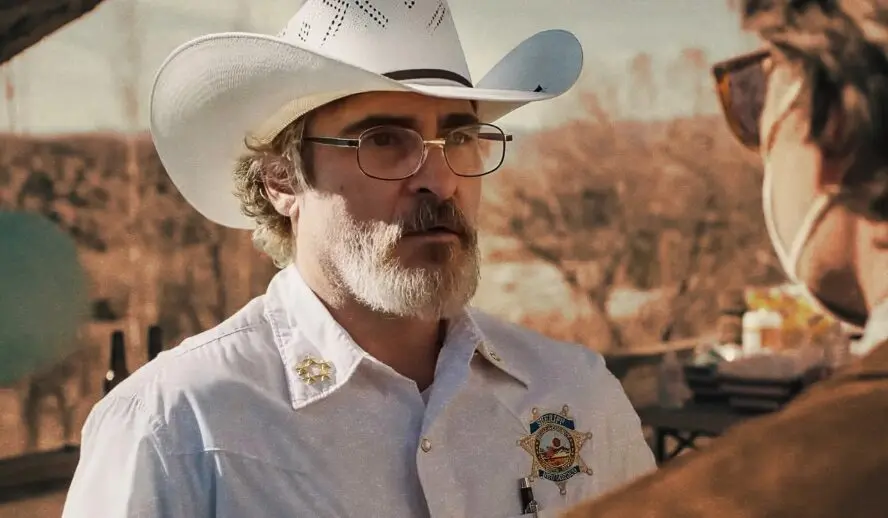You Want A Movie Where You’re Really Uncomfortable?
Then head on down to ‘Eddington.’ Ari Aster once again delivers a deeply unsettling film- one that explores the “new normal” we lived through back in 2020.
SPOILERS AHEAD: For an episode of ‘The Twilight Zone’ from 1960.
Ari Aster shared a list on Letterboxd of films that influenced this paranoiac modern Western. But after watching ‘Eddington’, I was surprised not to see a mention of an episode from the original ‘Twilight Zone’ titled “The Monsters Are Due on Maple Street.” Rod Serling’s simple but devastating parable of a seemingly tight-knit community ripped apart ends in hysteria and carnage– triggered, as the final twist reveals, by alien manipulation. Yet the aliens use no elaborate mind-control devices, only simple electrical interference that drives the townsfolk into paranoid distrust of one another by their own conspiracies and suspicions.
Things to do:
- Subscribe to The Hollywood Insider’s YouTube Channel, by clicking here.
- Limited Time Offer – FREE Subscription to The Hollywood Insider
- Click here to read more on The Hollywood Insider’s vision, values and mission statement here – Media has the responsibility to better our world – The Hollywood Insider fully focuses on substance and meaningful entertainment, against gossip and scandal, by combining entertainment, education, and philanthropy.
‘Eddington’ Is No Laughing Matter…Or Is It?
I’ve never found a filmmaker’s intentions to be of great importance– but they can be insightful.
So when Aster mentioned on a recent episode of ‘Blank Check with Griffin and David’ that he meant for ‘Eddington’ to be funny, I had to pause.
Because, truly, dear readers, watching the film felt like a rollercoaster. And something you should know about me: I don’t do rollercoasters. I’ve never liked the feeling. I’ve even had to be tricked onto them. Long story short, I was visiting Universal Studios for the first time, I had a lot of other things on my mind, and my best friend managed to convince me- technically, flat out tricked me- that ‘Revenge of the Mummy’ wasn’t a coaster, just a calm exhibition ride like ‘Empire of the Penguin’ at SeaWorld.
That’s what ‘Eddington’ felt like. Like I’d been tricked into reliving a time I’d rather avoid- my stomach knotted, dreading the inevitable drop. But when it was over, I found myself grateful for the ride. I didn’t enjoy it, but I needed it.
It’s easy to call this movie “too soon.” It’s been just five years since the world shut down. Since we looked at each other with suspicion in grocery store aisles. Since conversations with friends and family dissolved into arguments about masks and mandates and misinformation. Aster packages that moment in history for what it was: not just scary, but unknowable. We didn’t have answers. We barely had language.
I don’t believe that Aster’s intentions with this film were as mischievous as my best friend’s, but rather an attempt at capsulation of a moment in history.
That said, the film does risk poking at wounds that haven’t healed for some viewers- especially those still stuck in the fear and anger of that strange period, which, let’s not forget, was only five years ago.
And so, in this case, I do think we have to consider the filmmaker’s intention.
After all, he says it’s supposed to be funny.
WATCH THE TRAILER of the Film and the Revolution: ‘Can I Go Home Now?’
The Children Around the World Continue to Ask the question
Funny How?
If Aster says he wants ‘Eddington’ to be funny, then we have to ask: what kind of funny? To understand his intention, we might turn to the old formula- tragedy plus time equals comedy.
Though not much time has passed, Aster packages this moment in history exactly as it was: a divided, frightening period when meaningful conversation broke down and everyone seemed to talk past each other.
Aster has also pointed to Oliver Stone’s ‘JFK’ as a major influence, especially for its sharp portrayal of “the fever of conspiracy thinking.”
There’s no guiding conscience in ‘Eddington’. No moral compass, no calm center. No character to anchor the audience. Just chaos, steadily rising then exploding. Paranoia spreads like wildfire– and Aster doesn’t stop it. He lets it burn.
That’s why tone is everything here. The film walks a delicate line: part dark satire, part bleak historical document that devolves into a twisted dream. ‘Eddington’ doesn’t want you to take sides. It wants you to remember how it felt when everyone was taking sides.
Related article: Why Queen Elizabeth II Is One Of The Greatest Monarchs | Her Majesty Queen Elizabeth II of United Queendom of Great Britain & Northern Ireland (Video Insight)
Related article: Want GUARANTEED SUCCESS? Remove these ten words from your vocabulary| Transform your life INSTANTLY
Related article: Streaming Services Are Killing Movie Theaters
West of Redemption
What cements ‘Eddington’ as a true Western isn’t just its lawman protagonist or its dust-choked town- it’s how the film grapples with the classic Western conflict: Old World versus New World. Like ‘No Country for Old Men’, ‘The Wild Bunch’, ‘Unforgiven’, and even Jim Jarmusch’s dreamlike ‘Dead Man’, Aster’s film explores the slow, painful erosion of a moral order that perhaps never fully existed.
In ‘Eddington’, the sheriff doesn’t ride in to restore justice- he rides out into uncertainty. He doesn’t tame the frontier. The frontier tames him. The pandemic isn’t mere backdrop; it is the landscape of this new West, where rules are unclear, alliances fragile, and enemies often imagined.
Like ‘No Country for Old Men’, this film is haunted by the absence of a “code” that once defined men like Joe Cross. The badge, the uniform, the handshake- none of it offers protection now. And like ‘The Wild Bunch’, ‘Eddington’ shows men out of time, clinging to an old framework in a world that has already moved on.
With ‘Unforgiven’, we sense a similar moral decay masquerading as frontier justice. And in ‘Dead Man’, though I admit I’m still grappling with its meaning, the West itself becomes a metaphor for death– the westward journey as an inevitable march toward finality. ‘Eddington’ channels all of this: the West not as origin myth, but as postmortem.
Aster doesn’t just set his film in the West- he uses the genre’s bones to reveal how hollow it’s become. Maybe that’s why the horror lands so hard. We thought the sheriff could save us. We were wrong.
Related article: EVOLUTION: Every Ryan Gosling Role From 1995 to 2020, All Performances Exceptionally Poignant
Related article: EVOLUTION: Every Henry Cavill Role From 2001 to 2021, All Performances Exceptionally Poignant
Related article: All Best Actor/Actress Speeches From The Beginning Of Oscars 1929-2019 | Hollywood Insider
A Pin in the Zeitgeist
As a period piece, ‘Eddington’ may be one of the most exacting I’ve ever seen. And not because of the props or costumes, though those are well-chosen. The film nails the language of the time- the way we spoke to one another, the types of small talk that turned hostile, the performative concern, the tactical hesitations in every conversation.
It’s not ‘Barry Lyndon’ and its candlelit lenses. It’s not ‘The Northman’ with its hand-built Viking ships. It’s something scarier: a perfect replication of the cultural fog we were all trapped in, where nothing was solid and everything felt like a test. Aster captures the zeitgeist like a pinned butterfly- silent, immobile, unmistakable.
There’s a rule in storytelling, especially with political work: show, don’t tell. And to his credit, Aster mostly does. The characters debate each other in believable ways. The preaching we hear is not coming from the filmmaker, but from the people onscreen- people echoing real things we all heard (and maybe said) during that period. It’s less a screenplay than a transcript from the national psyche.
Eventually, ‘Eddington’ narrows its focus to Joe Cross, the sheriff, whose descent into madness evokes Shakespearean tragedy- he becomes a kind of American Macbeth. The chaos that once surrounded him begins to take root inside him. “Every noise appalls me,” Macbeth says- and Joe’s journey follows a similar arc, culminating in violence that feels both inevitable and completely preventable.
Until that point, the politics of the film remain ambiguous. There are no “right” characters. Just different shades of fear. That ambiguity is what makes the final act so impactful. Once Joe crosses the line, it’s too late to put the genie back in the bottle. The town’s paranoia is no longer just a mood- it’s a monster.
Related article: Understanding the Star Wars Timeline
Related article: A Tribute to Francis Ford Coppola: One of Cinema’s Unforgettable Directors | ‘Megalopolis’, ‘The Godfather’ & More
Related article: #metoo Revolution: Powerful Questions That Need Answers
Related article: FACT-CHECKED Series: Timothee Chalamet and 32 Facts about The Young Superstar
On the Edge of Us All
‘Eddington’ is not a crowd-pleaser. It’s not even clear it wants to be watched. It confronts you with things you’ve likely tried to forget. And in doing so, it forces you to reflect on how close we all came to the edge- how little it took to turn neighbors into threats, suspicion into certainty, and fear into action.
It’s not horror in the traditional sense. But it’s one of the scariest movies I’ve ever seen. And maybe- just maybe- one of the most important.
By Joseph Tralongo
Click here to read The Hollywood Insider’s CEO Pritan Ambroase’s love letter to Cinema, TV and Media. An excerpt from the love letter: The Hollywood Insider’s CEO/editor-in-chief Pritan Ambroase affirms, “We have the space and time for all your stories, no matter who/what/where you are. Media/Cinema/TV have a responsibility to better the world and The Hollywood Insider will continue to do so. Talent, diversity and authenticity matter in Cinema/TV, media and storytelling. In fact, I reckon that we should announce “talent-diversity-authenticity-storytelling-Cinema-Oscars-Academy-Awards” as synonyms of each other. We show respect to talent and stories regardless of their skin color, race, gender, sexuality, religion, nationality, etc., thus allowing authenticity into this system just by something as simple as accepting and showing respect to the human species’ factual diversity. We become greater just by respecting and appreciating talent in all its shapes, sizes, and forms. Award winners, which includes nominees, must be chosen on the greatness of their talent ALONE.
I am sure I am speaking for a multitude of Cinema lovers all over the world when I speak of the following sentiments that this medium of art has blessed me with. Cinema taught me about our world, at times in English and at times through the beautiful one-inch bar of subtitles. I learned from the stories in the global movies that we are all alike across all borders. Remember that one of the best symbols of many great civilizations and their prosperity has been the art they have left behind. This art can be in the form of paintings, sculptures, architecture, writings, inventions, etc. For our modern society, Cinema happens to be one of them. Cinema is more than just a form of entertainment, it is an integral part of society. I love the world uniting, be it for Cinema, TV, media, art, fashion, sport, etc.
More Interesting Stories From The Hollywood Insider
– Want GUARANTEED SUCCESS? Remove these ten words from your vocabulary| Transform your life INSTANTLY
– A Tribute to Martin Scorsese: A Complete Analysis of the Life and Career of the Man Who Lives and Breathes Cinema
– Do you know the hidden messages in ‘Call Me By Your Name’? Find out behind the scenes facts in the full commentary and In-depth analysis of the cinematic masterpiece
– A Tribute To The Academy Awards: All Best Actor/Actress Speeches From The Beginning Of Oscars 1929-2019 | From Rami Malek, Leonardo DiCaprio To Denzel Washington, Halle Berry & Beyond | From Olivia Colman, Meryl Streep To Bette Davis & Beyond.
– In the 32nd Year Of His Career, Keanu Reeves’ Face Continues To Reign After Launching Movies Earning Over $4.3 Billion In Total – “John Wick”, “Toy Story 4”, “Matrix”, And Many More

Joseph Tralongo is a playwright and screenwriter who approaches storytelling with a deep respect for film’s ability to distill human behavior into meaningful moments. His personal work- i.e. his plays, screenplays, and films- leans into semantic tension, moral ambiguity, and the quiet unraveling of social dynamics- not to preach, but to parse. For him, writing is a slow excavation of truth through craft. With a background in theatre and independent film, he brings a structural precision and dramatic instinct to every film he reviews. Hollywood Insider’s mission to champion substance over spectacle aligns with Joseph’s belief that storytelling should investigate, not dictate.



